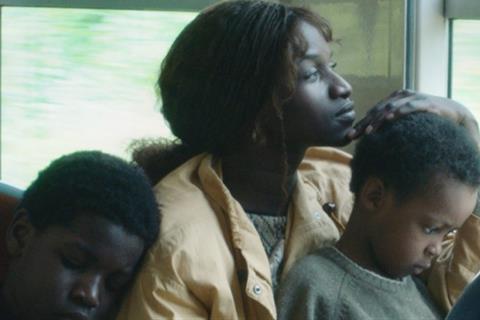A sensitive and complex triptych of a migrant family from the Ivory Coast arriving in 1980s France

Dir/scr: Léonor Serraille. France. 2022. 117 mins
A family saga told as a triptych, Mother And Son spans two decades as it follows the arrival in Paris of Rose (Annabelle Lengronne) and her two sons from the Ivory Coast in the late ’80s. A sparse narration from the youngest boy, the now adult Ernest, loosely strings together the film’s three chapters, told from the point of view of each in turn, starting with the fiercely charismatic and fascinating Rose.
A sensitive and complex examination of the shifting tensions in a migrant family
Lengronne’s arresting screen presence and the magnetic but trickily mercurial character of Rose makes for a forceful first instalment of the film. Once the focus shifts from her to the boys, first Jean and finally Ernest, Rose’s absence from the screen is keenly felt. And it is in the first chapter that the wayward spirit of writer/director Léonor Serraille’s acclaimed debut, Jeune Femme, is most evident. Still, although Mother And Son loses some of its energy as it unfolds, it is still a sensitive and complex examination of the shifting tensions in a migrant family. And if Lengronne unbalances the picture at times, that is mainly because her star quality is evident in every frame in which she appears.
Serraille makes her debut in Cannes’ main competition, having won the the Caméra d’Or at the 2017 Cannes Film Festival with Jeune Femme, which screened in Un Certain Regard. With its multiple viewpoints and extended period span, this is a step up in terms of ambition, but doesn’t quite match the propulsive, firecracker spark of the director’s debut. Still, the film is a quality production: it is handsomely shot by Hélène Louvart and will likely be of interest to arthouse distributors, particularly those with a focus on female-led stories and women directors.
Freshly arrived in France, Rose and the children are living temporarily with relatives. It is a warm and welcoming set up, but a cramped one. And it doesn’t take long for tensions, frequently captured by a deft child’s eye-level lens, to reveal themselves. Rose rejects the very obvious attempt to set her up with an eligible partner, the affable but tragically uncool “Julius Caesar” (Jean-Christophe Folly). “I choose my men myself,” says Rose, before going on to do just that, making high-voltage eye contact with a builder on the roof adjacent to the hotel where she works as a maid. Her morals are further questioned when she comes home with a box of complimentary Jacques Chirac chocolates which may or may not have been stolen, depending on how flexibly the concept of theft is interpreted.
Rose is wilful, impulsive and flirtatious. But when she is with her boys, she is entirely present for them. Unfortunately, the time that she is able to spend with them is whittled down as the years pass. She moves the family to Normandy to join her lover Thierry. But she still has to work in Paris, leaving her older boy, Jean (played as a teenager by Stéphane Bak), in charge of the running of the household.
The second chapter of the film, Jean’s story, shows how the pressure and responsibility causes this high-achieving teenager to crack. This section of the film is the one which fails to cohere, playing out as a patchwork of scenes which haven’t quite been sewn together. The pull of two cultures, his African roots and his French nationality, becomes evident in a score which mixes together African rhythms with European chamber music. It sounds a little awkward and jarring, but then that is presumably the point.
The film’s final section, focussing on the adult Ernest (Ahmed Sylla) as a college philosophy teacher, is perhaps more a coda than a fully realised chapter, showing Ernest partially estranged from both his mother and his brother, but the closest of the three to finding fulfilment in his life.
Production company: Blue Monday Productions
International sales: MK2 Films intsales@mk2.com
Producer: Sandra da Fonseca
Cinematography: Hélène Louvart
Editing: Clémence Carré
Production design: Marion Burger
Main cast: Annabelle Lengronne, Stéphane Bak, Kenzo Sambin, Ahmed Sylla, Sidy Fofana, Milan Doucansi, Audrey Kouakou, Étienne Minoungou, Jean-Christophe Folly, Majd Mastoura, Pascal Rénéric, Thibaut Evrard, Angelina Woreth
























